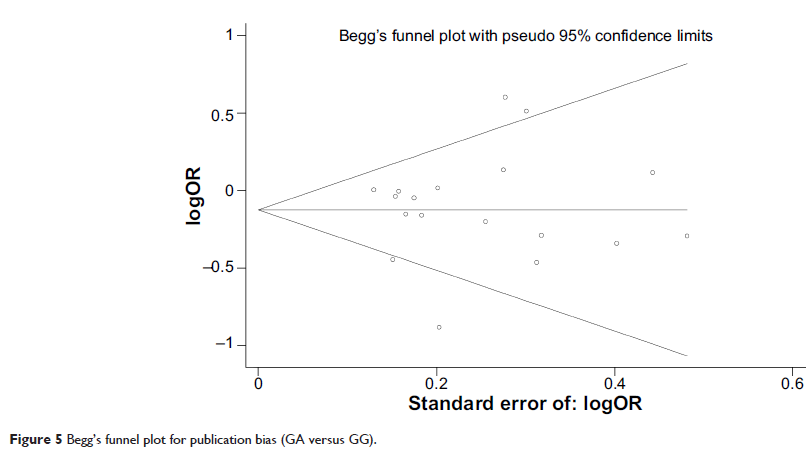109669
论文已发表
注册即可获取德孚的最新动态
IF 收录期刊
- 3.4 Breast Cancer (Dove Med Press)
- 3.2 Clin Epidemiol
- 2.6 Cancer Manag Res
- 2.9 Infect Drug Resist
- 3.7 Clin Interv Aging
- 5.1 Drug Des Dev Ther
- 3.1 Int J Chronic Obstr
- 6.6 Int J Nanomed
- 2.6 Int J Women's Health
- 2.9 Neuropsych Dis Treat
- 2.8 OncoTargets Ther
- 2.0 Patient Prefer Adher
- 2.2 Ther Clin Risk Manag
- 2.5 J Pain Res
- 3.0 Diabet Metab Synd Ob
- 3.2 Psychol Res Behav Ma
- 3.4 Nat Sci Sleep
- 1.8 Pharmgenomics Pers Med
- 2.0 Risk Manag Healthc Policy
- 4.1 J Inflamm Res
- 2.0 Int J Gen Med
- 3.4 J Hepatocell Carcinoma
- 3.0 J Asthma Allergy
- 2.2 Clin Cosmet Investig Dermatol
- 2.4 J Multidiscip Healthc

已发表论文
XPA A23G 基因多态性与消化系统癌症的风险:一项综合分析
Authors He L, Deng T, Luo H
Published Date February 2015 Volume 2015:8 Pages 385—394
DOI http://dx.doi.org/10.2147/OTT.S75767
Received 14 October 2014, Accepted 20 December 2014, Published 5 February 2015
Background: Several studies have reported an association between the A23G
polymorphism (rs 1800975) in the xeroderma pigmentosum group A (XPA ) gene and risk of digestive
system cancers. However, the results are inconsistent. In this study, we
performed a meta-analysis to assess the association between XPA A23G
polymorphism and the risk of digestive system cancers.
Methods: Relevant studies were identified using the PubMed, Web of Science, China National Knowledge Infrastructure, WanFang, and VIP databases up to August 30, 2014. The pooled odds ratio (OR) with a 95% confidence interval (CI) was calculated using the fixed or random effects model.
Results: A total of 18 case-control studies from 16 publications with 4,170 patients and 6,929 controls were included. Overall, no significant association was found between XPA A23G polymorphism and the risk of digestive system cancers (dominant model: GA + AA versus GG, OR 0.89, 95% CI 0.74–1.08; recessive model: AA versus GA + GG, OR 0.94, 95% CI 0.74–1.20; GA versus GG, OR 0.89, 95% CI 0.77–1.03; and AA versus GG, OR 0.87, 95% CI 0.64–1.19). When the analysis was stratified by ethnicity, similar results were observed among Asians and Caucasians in all genetic models. In stratified analysis based on tumor type, we also failed to detect any association between XPA A23G polymorphism and the risk of esophageal, gastric, or colorectal cancers.
Conclusion: This meta-analysis indicates that the XPA A23G polymorphism is not associated with a risk of digestive system cancers.
Keywords: xeroderma pigmentosum group A, polymorphism, digestive system cancer, meta-analysis
Methods: Relevant studies were identified using the PubMed, Web of Science, China National Knowledge Infrastructure, WanFang, and VIP databases up to August 30, 2014. The pooled odds ratio (OR) with a 95% confidence interval (CI) was calculated using the fixed or random effects model.
Results: A total of 18 case-control studies from 16 publications with 4,170 patients and 6,929 controls were included. Overall, no significant association was found between XPA A23G polymorphism and the risk of digestive system cancers (dominant model: GA + AA versus GG, OR 0.89, 95% CI 0.74–1.08; recessive model: AA versus GA + GG, OR 0.94, 95% CI 0.74–1.20; GA versus GG, OR 0.89, 95% CI 0.77–1.03; and AA versus GG, OR 0.87, 95% CI 0.64–1.19). When the analysis was stratified by ethnicity, similar results were observed among Asians and Caucasians in all genetic models. In stratified analysis based on tumor type, we also failed to detect any association between XPA A23G polymorphism and the risk of esophageal, gastric, or colorectal cancers.
Conclusion: This meta-analysis indicates that the XPA A23G polymorphism is not associated with a risk of digestive system cancers.
Keywords: xeroderma pigmentosum group A, polymorphism, digestive system cancer, meta-analysis
